Breadcrumb
- Home
- Additional Resources
- Resources For International Students
Resources For International Students
Students’ Voice
What do other international students say about University Counseling Service:
* We recognized that the current video is outdated and not representative of our varied international student populations in terms of race/ethnicity, nationality, and language proficiency. We hope to make a new video soon.
UCS Services Flowchart
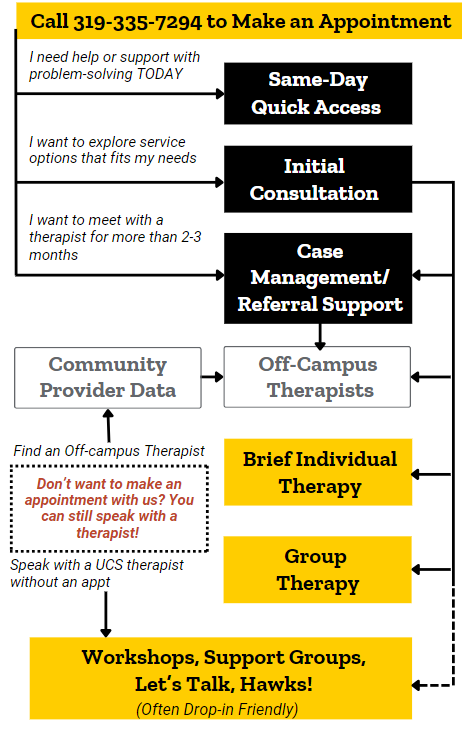
Upcoming Event
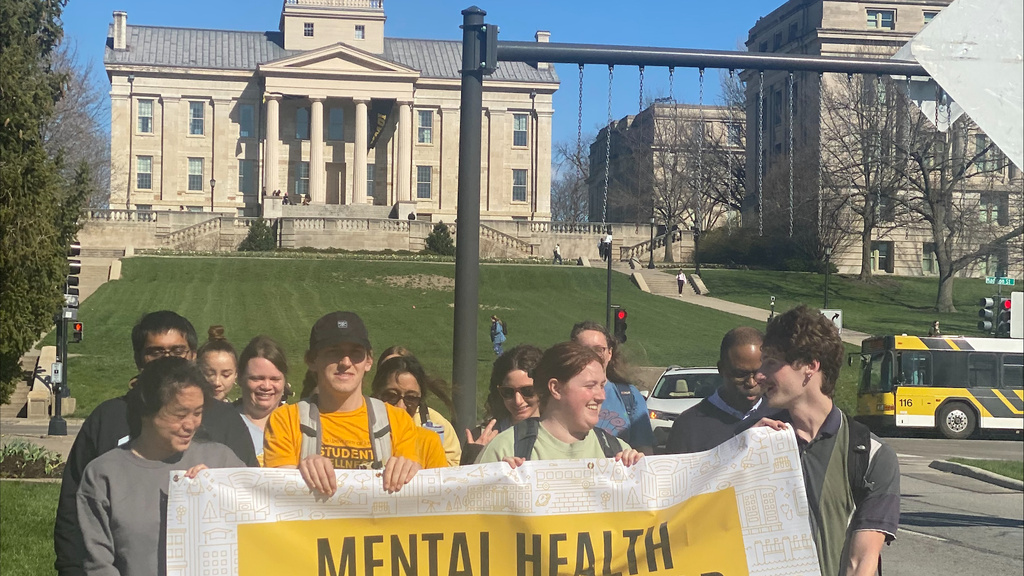
Mental Health Around The World
Mental Health Around the World is a student-led initiatives that focus on culturally sensitive mental health and self-care strategies.
Date: April 2, 2025
Location: IMU International Ballroom
Common Myths about Counseling
Watch the video to learn about the myths and facts about mental health concerns and counseling!
Myth 1: Counseling is for crazy people.
False. Millions of people in the U.S. seek therapy. Seeing a therapist is as normal as going to the doctor when you break a leg. Many people seek therapy for adjustment difficulties, navigating cultural differences, and addressing barriers for academic success. In fact, seeking mental health care shows that you’re motivated, self-aware, and empowered.
Myth 2: Everyone will know I saw a counselor.
False. Everything you discussed in therapy is confidential. Your doctors or therapists are legally
Myth 3: I can handle my own mental health problems. If I can’t, that means I’m weak.
False. Seeking help for a mental health issue is similar to seeking help for any other medical problem. If you broke your leg, you wouldn’t try to heal yourself. Mental health is no different.
Myth 4: If I talk about drinking alcohol or doing drugs, I’ll get in trouble.
False. Mental health professionals are available to help you through a difficult time, and our offices are considered a safe place to discuss your experiences and what you are going through. We will not disclose conversations about alcohol or substance use to the University without your permission.
Myth 5. The things we discuss will be part of my permanent record and will be viewed negatively.
False. The information you share with your therapist will remain confidential. It will NOT be a part of school transcripts or any other school records.
Make an Appointment
Currently enrolled students at the University of Iowa can call the UCS at (319) 335-7294 or schedule in advance online for an appointment. You may come to our offices to schedule an appointment in-person. To verify that you are eligible for services, check out our eligibility FAQ.
- If you are a faculty or staff member, counseling services are provided through the UI Employee Assistance Program at (319) 335-2085.
- Students are required to make their own appointments. Find out more about UCS services and appointment types.
It may be dauting to call us. But please know that the scheduling process is straightforward, and our support staff is very helpful in walking you through the appointment options and required paperwork. We care about you and are here to support you. If you’d like to speak with a therapist who can answer your questions about mental health and facilitate scheduling, please feel free to drop-in one of the Let’s talk, Hawks! Programs.
If you are in a crisis or need support outside of our office hours (8 am to 5 pm, Mon to Fri), please utilize 24/7 Crisis Resources.
As an international student, English may not be your first language. English proficiency is NOT a requirement for counseling and our staff would love to work with you if you speak English as a second language. A few of our therapists have international experiences and can provide services in Chinese or other languages. You may request a Chinese-speaking therapist for your appointment. We strive to create space where all feel welcome, including international students.
Receiving Mental Health Information Without Making an Appointment:
You may receive mental health information without making an appointment at the UCS by coming to our outreach programs, or following our social media accounts (Instagram: @uiowaucs; Facebook: @uiowaucs).
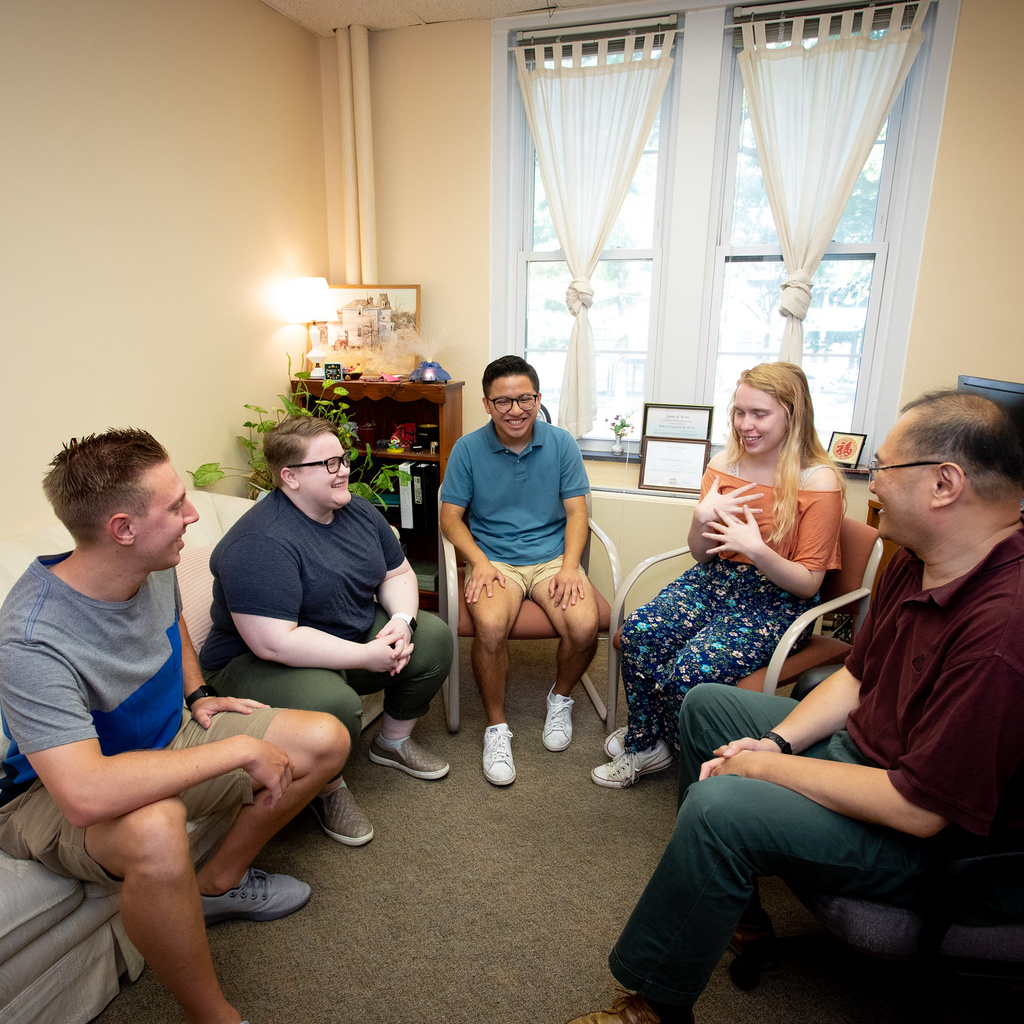
Workshops and Support groups
Topics range from anxiety, motivation, procrastination, emotional distress, ADHD, and substance use.
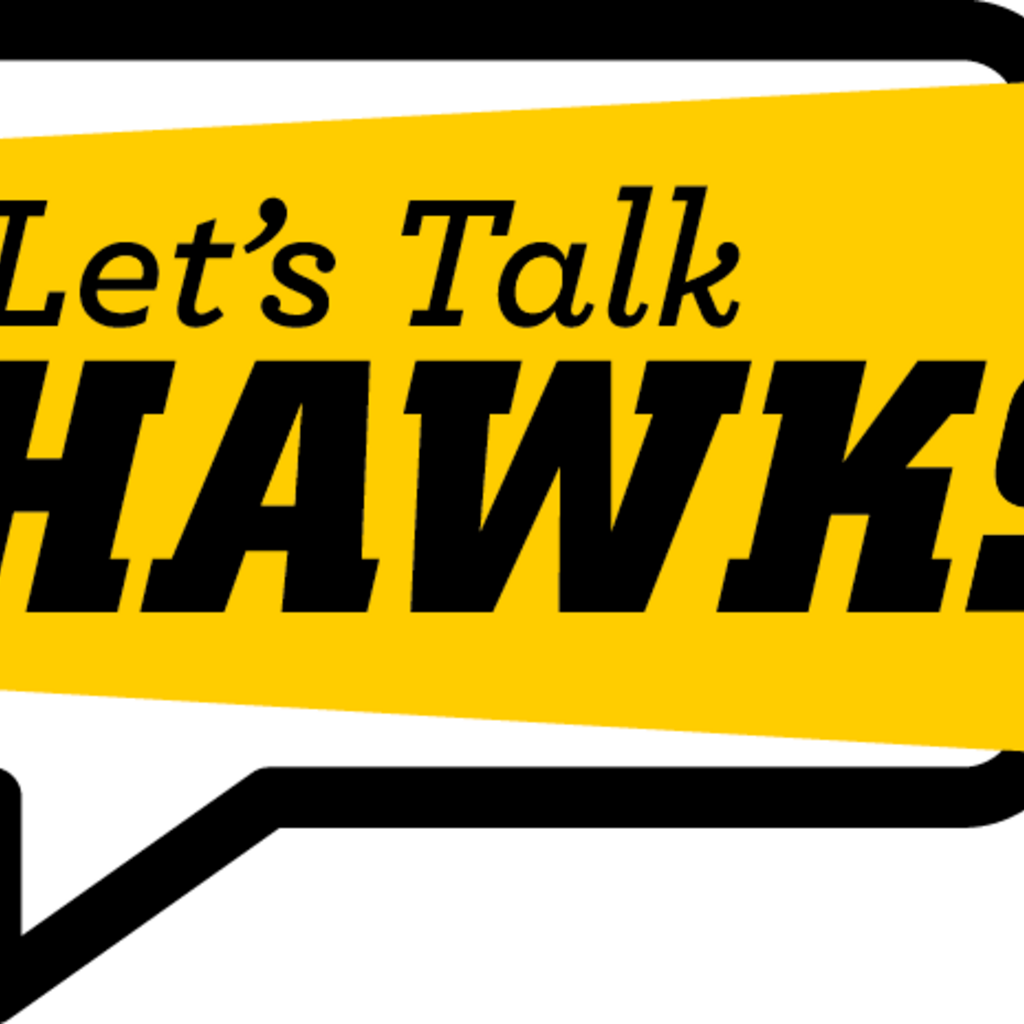
Let's Talk, Hawks! Program
1-on-1 informal conversation with a therapist to ask questions, receive support, or work on problem-solving.
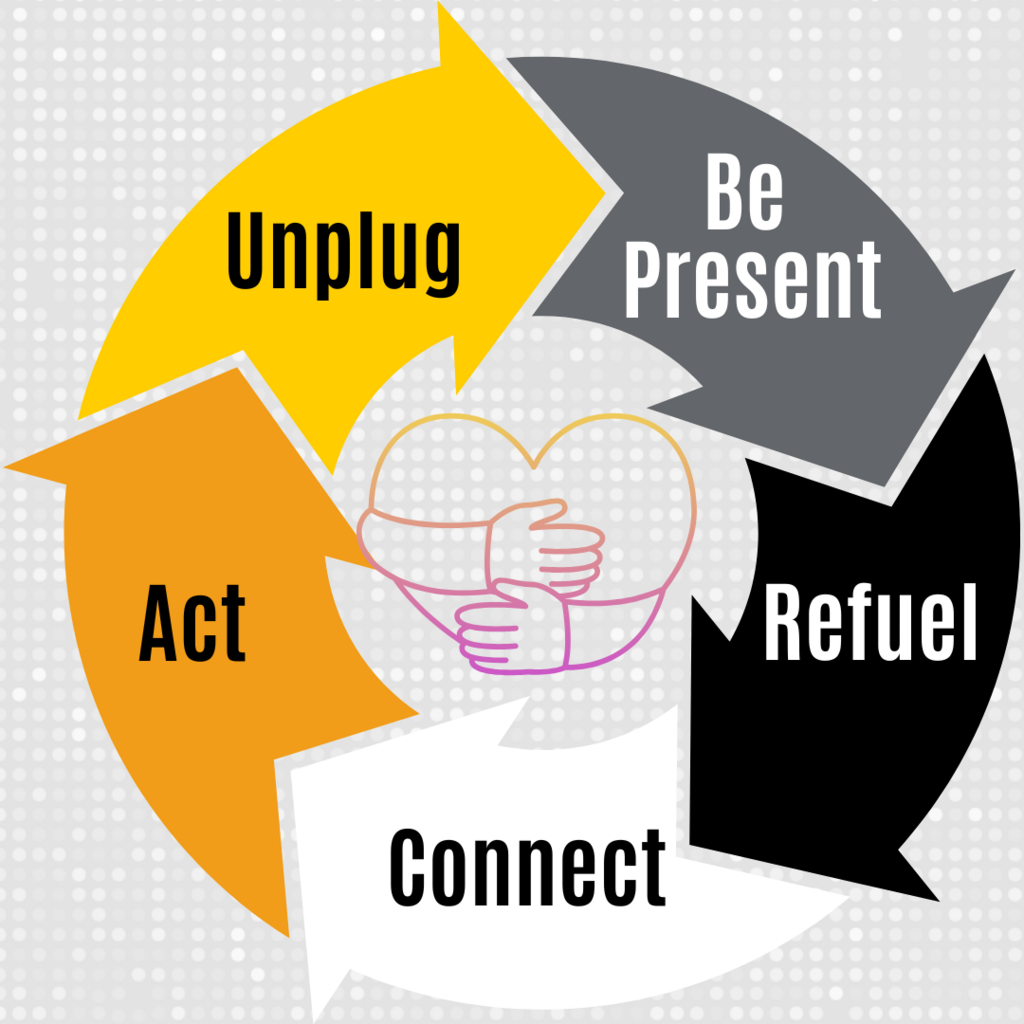
Handouts and Coping Skills
Mental health worksheets, handouts, and coping skills that you can read and watch at your own pace.
Insurance & Private Therapists:
When you meet with a private therapist, there are typically no session limits for therapy. Your therapist is likely to bill your insurance, and depending on your insurance benefits, you may need to pay some fees like a copay.
If you are insured through the University of Iowa, your insurance card will say UI Gradcare, SHIP, or UIChoice. Your dependents (spouse/partner and/or children) may use the same insurance for therapy if you’ve added them to your insurance plan (see information about enrollment and adding dependents). These plans use the Blue Cross/Blue Shield provider network, and no session limits or prior authorization required.
- SHIP, UIGradcare, UIChoice have no copay or coinsurance for in-network providers, meaning that you don’t need to pay anything out of pocket for your sessions. Your providers will bill your insurance, and you’ll receive an itinerary each month.
- Several private therapists in the community are in-network and bilingual or trilingual (including Mandarin-Chinese, Taiwanese, Japanese, Spanish, French, Russian, Lithuanian, or Turkish). To search for a private therapist who speaks your language and meet your preferences, please utilize our Community Provider Database.
If you have a different type of insurance than what is listed above, you should call your insurance provider to double-check your benefits for therapy. How much the cost of counseling is covered, is determined by your specific insurance plan. You may read this article for tips for calling your insurance company.
UCS offers Mental Health Navigation appointments to assist students in figuring out their insurance plans and find a private therapist. You may call us at 319-335-7294 to meet with a Mental Health Navigator if you’re enrolled and currently located in the U.S.
If You’re Currently Located Outside of the U.S.
Unfortunately, due to limitations in our professional licenses, UCS clinicians are unable to provide clinical services to students when they are physically located outside of the state of Iowa and the United States, even if they are enrolled in online classes.
Students are welcome to attend any of our virtual programming regardless of where they are located. Follow this link to see a current list of programming.
We are attempting to compile information that may be useful to students located in other countries who are seeking mental health support. This is not a comprehensive list, and we will continue to update as we become aware of additional resources.
Resources:
International Therapist Directory
- https://internationaltherapistdirectory.com/
- Please note that mental health resources vary greatly from country to country. UCS did not create, and does not maintain, this website, and cannot guarantee all resources remain consistently updated. Please also note that not all countries and locations are represented in this directory.
International suicide hotlines/emergency phone numbers and online crisis chats
- https://www.suicidestop.com/call_a_hotline.html
- Please note that mental health and emergency resources vary greatly from country to country. UCS did not create, and does not maintain, this website, and cannot guarantee all resources remain consistently updated.
For Students in China
- Detailed Guide to Find a Qualified Counselor in China (in Chinese)
- National Crisis Line: 12356
For students in South Korea:
- Suicide Prevention Hotline (24 hours): 1393
- Mental Health Crisis Hotline (24 hours): 1577-0199
- Life line (24 hours): 1588-9191 / www.lifeline.or.kr
- JoongAng(central) Suicide Prevention Center: 82-2-2203-0053 / spckorea.or.kr
- Seoul Suicide Prevention Center: 82-2-3458-1000 / suicide.or.kr
- Gyeonggi-do Suicide Prevention Center: 82-31-212-0437 / mindsave.org
- Gangwon-Do Suicide Prevention Center: 82-33-251-1970 / gwmh.or.kr
- Gwangju Suicide Prevention Center: 82-62-600-1930 / gmhc.kr
- Incheon Suicide Prevention Center: 82-32-468-9911 / imhc.or.kr:6032
- Daegu Suicide Prevention Center: 82-53-256-0199 / dgmhc.or.kr
- Busan Suicide Prevention Center: 82-51-242-2575 / suicide.busaninmaum.com
- Support Center for a family who has lost their family member to suicide: Korea Psychological Autopsy center; 82-2-555-1095 / psyauto.or.kr / warmdays.co.kr
For students in Nigeria:
- Global community of Mental Health Innovators: https://www.mhinnovation.net/resources
- Mentally Aware Nigeria Initiative (MANI): https://www.mhinnovation.net/collaborations
- Asido Foundation: The Birth of a Mental Health Advocacy Organization in Nigeria https://iacapap.org/asido-foundation-the-birth-of-an-innovative-non-profit-mental-health-advocacy-organization-in-nigeria/
These resources are NOT comprehensive. If you’d like to share mental health resources that you know from other countries, please email tianyi-xie@uiowa.edu. We’ll update the resources on the webpage.